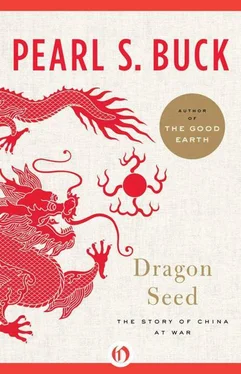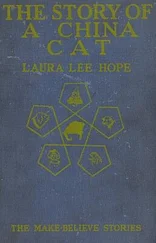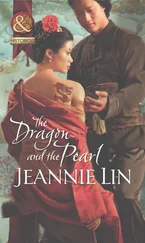But sometimes he thought they followed the moon, perhaps, or splintered themselves from the sun. For that there was enmity between sun and moon in the sky everybody knew. Two or three times in his lifetime this enmity had blazed into battle and sun would try to swallow moon or moon would swallow sun, and then everywhere people were frightened and shouted and cried and screamed into the sky and beat gongs and hollow drums and empty rice cauldrons or whatever they had at hand to make a noise. After the noise grew great enough the sun and moon would give heed to it and slowly they drew apart and went back to their own ways again. But if they had not heard the commotion from the earth, they would have fought until one had downed the other somehow, and then half the light from heaven would have perished, and worse if the sun had lost and been swallowed by the moon. But whatever the stars were, they were his, Ling Tan thought, if they were above his land, and he used to wonder if in another life his would be the power to reach up and pull a star down and hold it in the palm of his hand, and if he did would it burn there?
Such were Ling Tan’s thoughts and they were mingled with others that had to do with the cost of grain and the measure of his harvest and whether or not he ought to divide the land among his three sons when his time came to go into earth himself, or ought he to let the eldest have it and the second help him. But if he did this then would there be food enough for the third one when he married and begat his own sons and then would they not quarrel because their bellies were not full? For Ling Tan knew out of his common wisdom that when men have land enough to give them food they have nothing to quarrel about beyond the small things that a night’s sleep can change. But when land is the cause of quarrel men will quarrel to killing each other.
He put the matter to his eldest son one day, not because he felt himself old and beyond work, but a man’s years are lived when they are lived and there is a time for everything, and now was the time to plan and to think while his mind was strong in his strong body.
“Can this land feed three men and their wives and children after I am gone?” he asked his eldest son.
Lao Ta was at that moment drawing water out of the well by rope and bucket and he drew it up and drank first and then splashed what was left over his bare shoulders and arms.
“It can, if you ask me if I am willing to have it so,” he said. “For I will eat less meat if my brothers will and live in peace with them.”
More than this Ling Tan did not ask because he was satisfied with the answer and with his eldest son’s honest looks. He could leave the land to him and know that whatever it bore this eldest son would divide equally among all, and if the others did not like it, they could go elsewhere and Ling Tan’s dust would not stir in its sleep, because he had done well enough in his time.
… To such things as stars and sun and moon Ling Sao gave no thought. What, she would have said, had they to do with her? The house was full of matters she must think about and manage and mend, and its lives all looked to her. Thus her smallest grandson as month followed month did not know which was his true mother, the one from whose soft breast he drank, or the strong big woman who took him often and carried him astride her hip while she came and went, and fed him with sweetened rice from her lips. Mother and grandmother were one to him. And her sons, though Ling Sao wanted them married and married early so that there need be no foolishness in the house, still she knew that no young woman could be to her sons what she was, and she loved to hear their voices, now the voices of men, call to her as once they had called in little childish piping, “M-ma!”
“Yes, my meat dumpling!” she always answered, and no one thought it strange that so she answered even to her eldest son, himself a father, when he came to her to get a button mended or the thong of a sandal secured. For Orchid was one of those women who when they have given birth are in a daze at what they have done and she could think of nothing but her last child and she would sit idle staring at him and listening to him breathe while he slept and think that she was busy and too busy to tidy their room or to sew a rent in her husband’s coat or to make a shoe sole. For this the mother cursed her secretly and complained about her to her husband.
“That Orchid,” she grumbled one night in bed, “she has this last child and now she has no time for anything else even the elder one. And if it were not for me our son himself would starve and go in rags like a beggar. She can do nothing but sit and look at the child, though he is still so small that put him anywhere and there he lies. What when he crawls and walks and what when there is a third and a fourth? Why, when I had a child I counted it nothing. Do you remember how I tended the fields and cut the wheat and harvested it and bore the second child and how I put the two of them in a tub and did my work and no ill came to them? But she — oh, the last child’s breath will stop if she does not see it come in and out, and the child might swallow a mite of dust out of a beam of sun falling upon it!”
“There are not many women like you,” Ling Tan agreed, half asleep.
“And Jade,” Ling Sao mourned. “What use is Jade to me? Her mind is on that book our second son brought her. Yes, when her child comes—”
Ling Tan woke up. “Is Jade to have a child, too?”
She pursed her lips in the dark. “Her flux has stayed itself ten days beyond its usual coming,” she said solemnly, for, being a good mother to her sons, Ling Sao knew it was her duty to question her sons’ wives of such things. “And what she will do when the child comes if she has not finished reading that book I do not know.” She went on, “She will hold it in her hand, I swear, and let the child be born anyhow. It was an evil day when a book came into this house, and there is nothing so bad for a woman as reading. I had rather she took to opium.”
“No, not opium,” he said. “I saw that curse in my own old mother and never will an ounce of opium come into this house.”
“Well, then, not opium,” his wife agreed. For she knew what ill had befallen this house when Ling Tan’s mother in the forty-sixth year of her age had begun to smoke opium to soften a pain she had in her womb. Food and clothing, she cared nothing if she had neither, but the opium she must have, and she lay with her eyes half shut night and day, dreaming and sleeping and waking only if they tried to cure her of the habit. Nor had they heart to try very much, for the pain grew hard and strong in her and only with opium could she draw her breath. Seven years the thing had gone on and more money had been wasted in the buying of opium than had been spent in food or clothing, and worse than that, for in those years opium was made a forbidden thing by the magistrates and if any bought or sold or used the stuff he took his life into his hands. Ling Tan’s father knew this, and so he forbade his son to buy it and he himself went to secret places to get it, telling no one, and it came to be so dangerous a thing to do that each month or so when Ling Tan’s father knew he must go yet again to buy he arranged all his affairs with his son and warned him that if he did not come back he must not go out to search for him, because he would be in prison and beyond any hope of rescue and Ling Tan must behave him as though he were dead and remember that it was his duty to live on.
Time and again the two looked at each other knowing that it might be the last time, and not so long as he lived would Ling Tan forget that brave wrinkled face looking into his as his father risked himself yet once again for his old wife. He was glad at last when within three days a cholera carried both of them off and his mother first, so that his father could die in peace, knowing that his son had not to make the dangerous journeys in his place. So opium was for Ling Tan the destroyer of all peace, and he rejoiced when it grew yet more difficult and dangerous to buy and always more forbidden until now it was a thing scarcely ever heard of that any but the very rich could smoke an opium pipe.
Читать дальше












